
Mithras
Why is it that a lot of writers steer clear of ancient religious practices in fiction?
Is it because it’s awkward and clashes with their modern beliefs, religious or otherwise? Or perhaps it’s because they don’t feel comfortable writing about something so strange, practices they really know very little about?
There is a lot of good fiction set in the ancient world and I’m always trying to find new novels to entertain and transport myself. One thing I’ve noticed is that when it comes to the religious practices of ancient Greeks and Romans, they are often (not always) portrayed as half-hearted, greeted with a good measure of pessimism. It might be a passing nod to a statue of a particular god or goddess, or a comment by the protagonist that he or she was making an offering even though they didn’t think it would do any good.
There is often an undercurrent of non-belief, a lack of mystery.
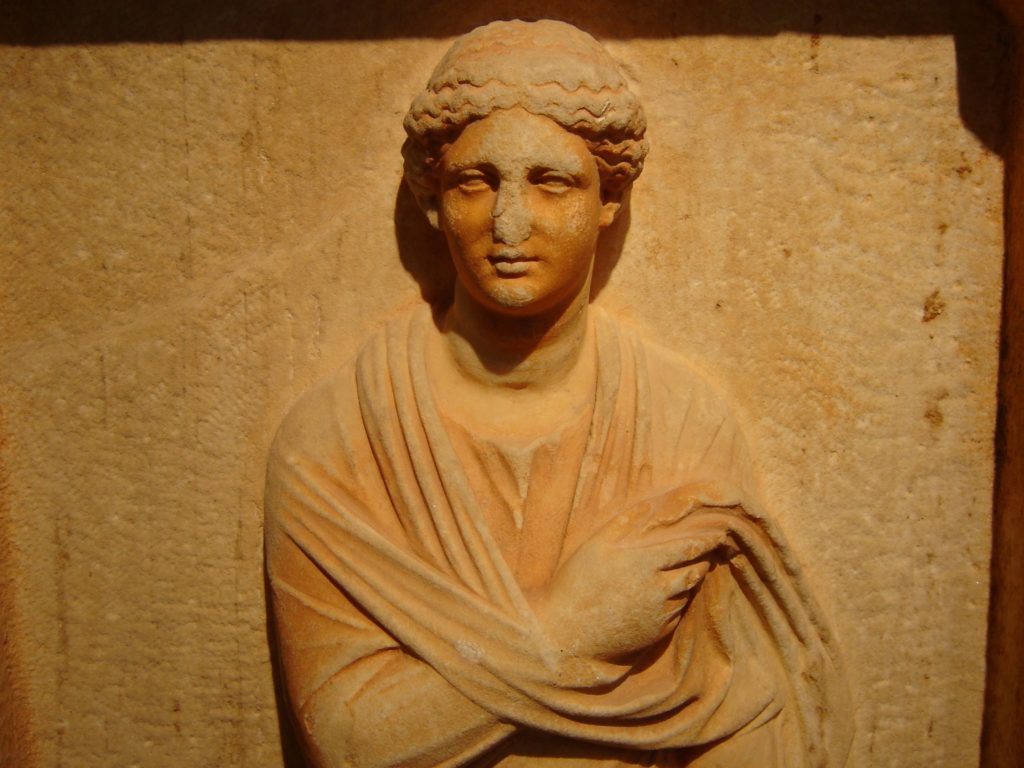
A relief of Demeter at the Elefsina site museum
Now, I’m not full of religious fervour myself; it’s difficult for anyone who has studied history in depth to be so. However, I see the value of it and respect its meaning for people across the ages. Religion is not necessarily at the forefront of our thoughts in modern, western society, but, in the ancient and medieval worlds, faith was often foremost in people’s thoughts.
It’s easy, blinded by hindsight, to dismiss ancient beliefs in the gods and goddesses of our ancestors.
As a writer, why would I want to dismiss something that is so important to the period in which my novels take place, something so important to the thoughts and motives of my characters?
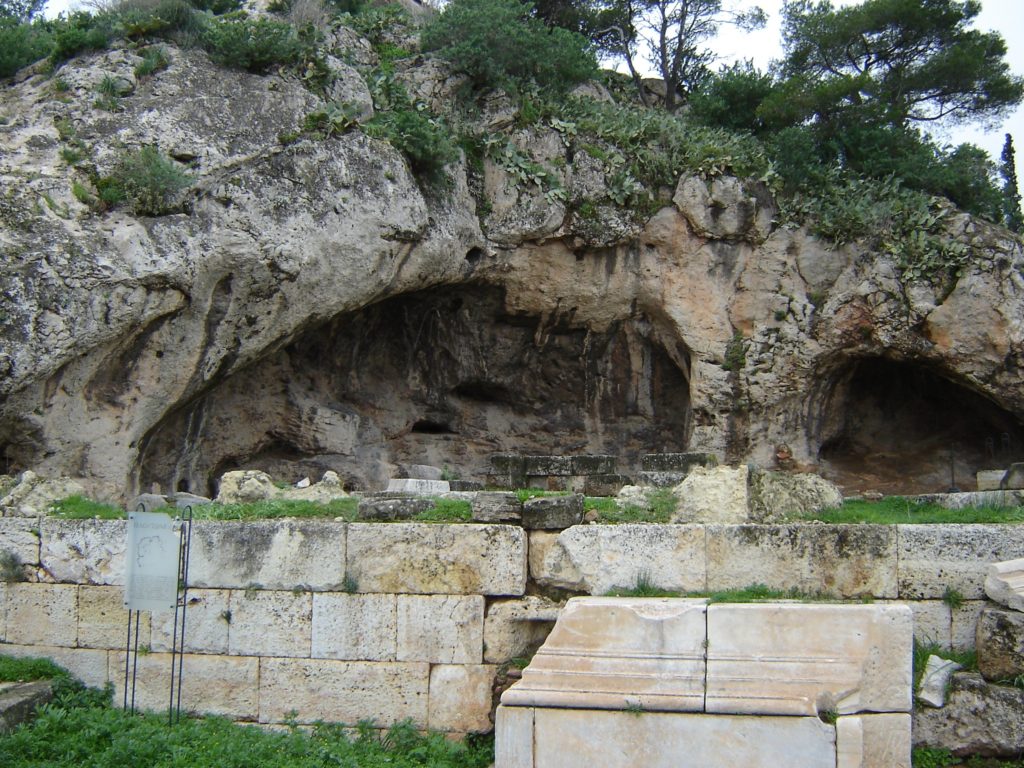
The Door to Hades – part of the sanctuary of Elefsis, where the Elefsinian Mysteries were carried out
People in ancient Greece and Rome (for example) believed in a pantheon of gods and goddesses who governed every aspect of life. From the emotions one felt or the lighting of a family hearth fire, to the start of a business venture or a soldier’s march to battle, most people held their gods and goddesses close. Indeed, there was a god or goddess with accompanying rituals for almost everything.
Religion enriches the ancient world in historical fiction and sets it apart from today, transports the reader to a world that is foreign and exotic. And the beauty is that there is so much mystery, so little known, that the writer can spread his or her creative wings.

Mars – Roman God of War
Of course, it’s always important to do as much research as possible – if the primary texts don’t tell you much, then look to the paintings on ceramics, wall frescoes, statues and other carvings. If you can get to the actual sanctuaries of the ancient world, even better, for they are places where even the most sceptical person can feel that there is (or was) indeed something different going on.
When I write, I try to do something different by having my main characters in close touch with the gods of their ancestors. Since it is historical fantasy, I can get that much more creative in having characters interact with the gods who have a clear role to play and are characters themselves.
The beautiful thing about the gods of ancient Greece and Rome is that they are almost human, prone to the same emotions, the same prejudices, that we are. From a certain point of view, they’re more accessible.
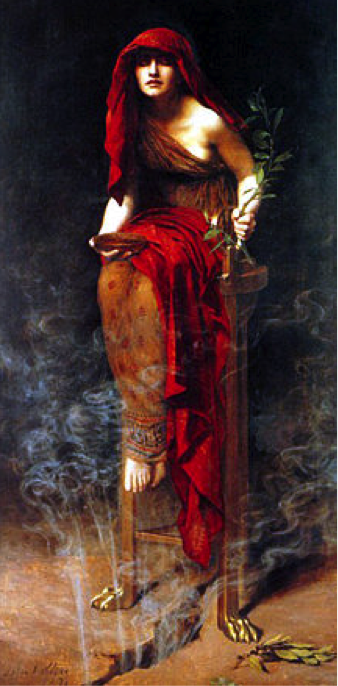
The Pythia
Despite this however, their worship, be it Apollo, Venus, Magna Mater, Isis, Jupiter, Mithras or any other, is still shrouded in mystery, clouded by the passage of time. Thousands and thousands of ancient Greeks and Romans flocked to Elefsis to take part in the mysteries dedicated to Demeter and Persephone, but little is known because devotees were sworn to secrecy. Oaths then were ‘water-tight’ as the saying went. Also, at one point, most of the Roman army worshiped Mithras, the Persian Lord of Light and Truth. Do we know much about Mithraism? Some, but there is still much that is not known and perhaps never will be.
In one of my books some of the characters pay a visit to the Oracle of Apollo at Delphi, which was still revered in the Roman Empire. Today, if you watch a documentary on Delphi, you will hear about how the oracle was used by politicians to deliver fabricated answers to those seeking the god’s advice. It is true that politics and religion in the ancient and medieval worlds were frequent bedfellows, but one can not dismiss the power of belief and inspiration. If the Athenians had not received the famous answer from the Delphic Oracle about being saved by Athens’ ‘wooden walls’, then they might not have had such a crushing naval victory over the Persians at Salamis.
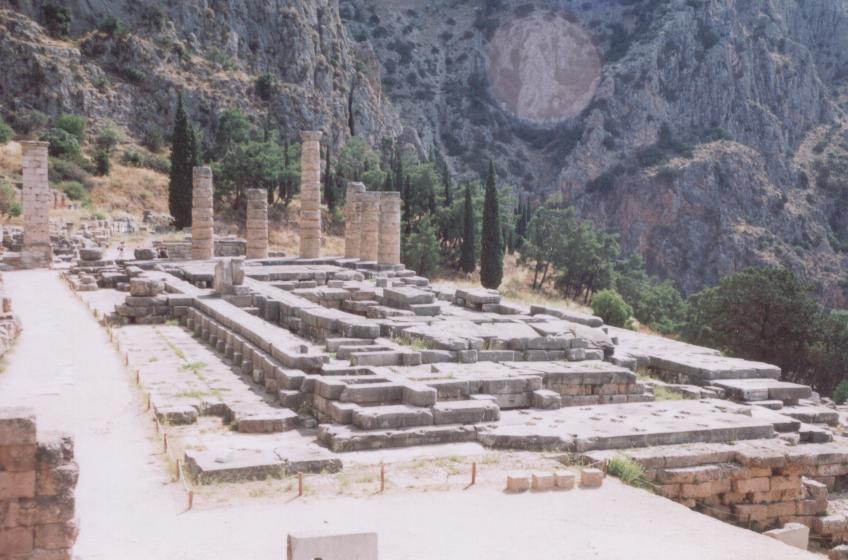
The Temple of Apollo at Delphi
There is a lot of room for debate on this topic and many, I suspect, will feel strongly for or against the exploration of ancient religion in fiction. If we feel inclined to dismiss ancient beliefs, to have our characters belittle them, to explain them away, we must ask ourselves why.
Do we dismiss ancient beliefs because we think they are silly, quaint, barbaric or false? Or do we stay away from them because we just don’t understand? Taking an interest in them, giving them some space on our blank pages, doesn’t mean we dismiss our own beliefs, it just means that we are open-minded and interested in accurately portraying the world about which we are writing.
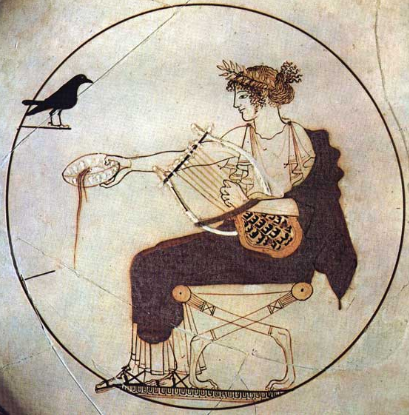
Kylix from Delphi showing Apollo himself pouring a libation
I like my fiction to be vast and multi-hued. Like the Roman Empire, all gods and goddesses are welcome to be a part of the whole and it is my hope that, being inclusive, my own stories will be more interesting, more true to life, more mysterious.
I suppose, at the end of the day, we each have to decide whether to take that leap of faith.
Thank you for reading.
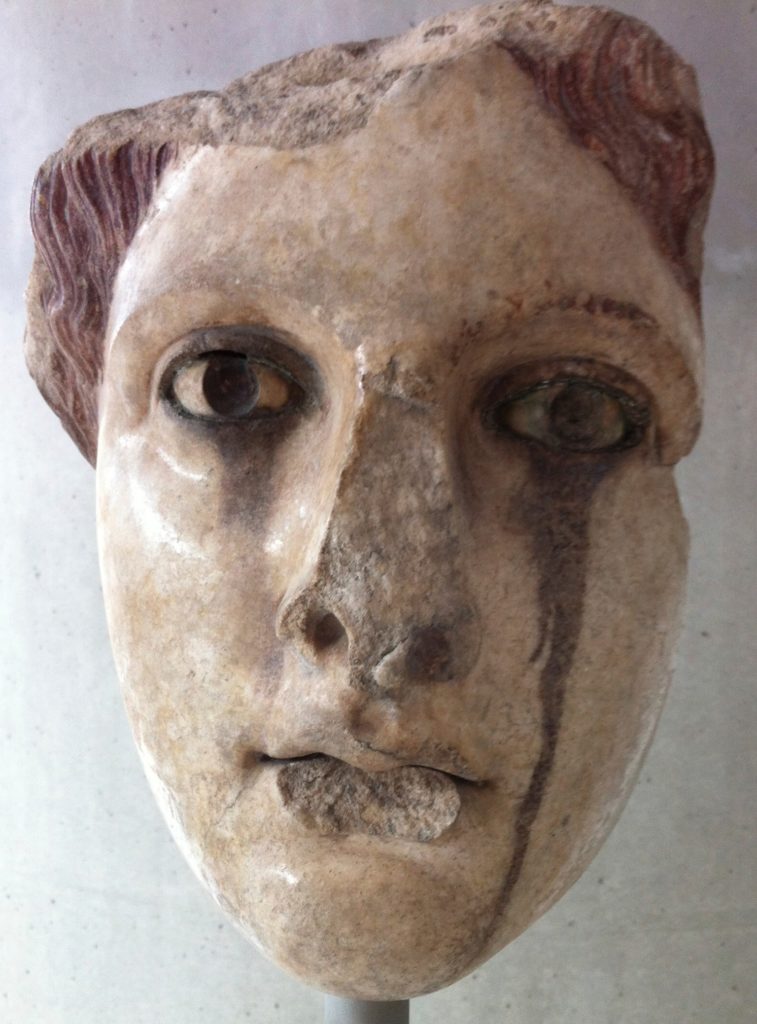











Thank you for an other interesting read – I never knew that politics and religion were often in bed together even in the ancient world. I guess it’s not surprising since human nature is the one constant throughout time.
Cheers,
JF lamontagne
Thanks for your comment, Jean-Francois 🙂
Yes religion and politics often went together, but I suspect they had a better, smoother relationship together in the ancient world as opposed to the medieval world. Cheers!
Adam,
I find your comment interesting that it is difficult for those who have studied history to be filled with religious fervour. I’d love to discuss that idea further but perhaps we should save it for your next visit to Tiverton. I know a good pub!
Cheers,
Bill
Thanks for your comment, Bill! Perhaps my choice of words was not the best. I certainly don’t mean that if you study history, you are less likely to have faith. Not at all. I think I attached a more negative connotation to ‘fervour’ in that part of the post. Something more along the lines of extremism in any religion. I guess an example would be that having studied the Crusades during the Middle Ages, and learned all about what was done ‘in the name of God’ and how scriptures were twisted for gains – then certainly doubt is cast on the church as an institution. But you’re right, perhaps we should save the rest of the conversation for a pub visit the next time I’m in Tiverton! Sounds brilliant! Cheers 🙂
I think that your choice of wording was excellent and I wouldn’t want to see you apologising for saying it like it is: if one has studied philosophy or history (and, hence, is too aware of the fact that religion is a human invention, created in times when there was no constitution to regulate social affairs and human behaviour and interaction), then it is (I wouldn’t say ‘difficult’, exactly) impossible to believe in anything transcendent or to see any truth in a dogma. Historical knowledge and wisdom or insight that comes from comparative research about various civilisations (and their respective religions) negates the notion that religions altogether hold any truth, but instead helps us trace the common ground, the basic mundane and human needs that created them.
It was an exceptional observation. I wanted to share your post for that wording alone.
Cheers for your comments, Elie. Studying history certainly pulls back the curtain on religious institutions (like the church) and what we see there is often not pleasant, controlling. However, I also wouldn’t want to explain away the mysteries of our world and the human psyche. Who’s to say that there isn’t some higher power in the universe, by whatever name(s)? I want to be inspired by life and all that that entails, and, for better or worse (depending on one’s point of view or perspective) Faith is something that has always been a part of that journey. I can certainly do without the organized religious institutions, though I guess they have a purpose in creating community and social glue in some cases. I suppose one reason I find ancient religions (mainly Greek and Roman) so fascinating is that faith was more personal and, well, somewhat ‘customizable’. That didn’t mean ancient Greeks and Romans lacked faith, it just meant they had more freedom in their beliefs. These are just my personal thoughts. At any rate, it makes for fun reading and writing of historical fiction! Thanks again for your thoughtful and passionate comments! 🙂
Really enjoyed your thoughts on religions and in particular ancient religions.
Are you familiar with the works of Joseph Campbell? I’m betting you are. I find his teachings invaluable in any discussion of religion in general and again in any discussion of ancient religion in particular. Thanks again for your always thought provoking work.
Steve
Many thanks for the kind words, Stephen! And yes, I am familiar with Joseph Campbell’s work. The Hero with a Thousand Faces is a great book for any historian or writer! Cheers and thanks for stopping by 🙂
Thank you for raising a very interesting subject. As an editor working on fiction set in late antiquity, it is good to see the spotlight shone on the overlap between pagan religions and early Christianity. We live in such a polarised age, we can easily overlook the common denominator between early rituals and established religion. On this note, the novel ‘Jerome & His Women’ by Joan O’Hagan, set in late antiquity and dealing with the controversies surrounding the creation of the Bible in Latin is very relevant (https://blackquillpress.com/jerome).
Thank you for your comment, Denise. So true! Also, thank you for the book recommendation. I’m adding it to me TBR list! Cheers to you 🙂
Thank you for your thoughts. This is a very interesting discussion and I am delighted to be part of it. It begs the question: is the study of philosophy/history and religious faith mutually exclusive? Personally, I don’t think so, but raising the question is a valuable first step. As is correctly pointed out, the pagan gods were just so delightfully human in temperament and action – which may go some of the way towards explaining why the monotheistic religions, with their idealism and insistence on eternal and universal values took root…
Perhaps examining the links between cultures and religions rather than the often-documented divides is the way forwards, both in terms of literature and philosophy?
Well said, Denise! I think there is a lot more that different cultures and religions have in common that people think, more that perhaps ties them together at the end of the day. An example is Mithraism and Christianity – some have pointed out the great similarities between the ancient Persian/Roman mystery religion and Christianity and how it may have been a precursor to Christianity (wait for the forthcoming post on Mithraism). How many religions have a suffering ‘Christ-like’ figure at their heart? I think we should perhaps look more to texts like Sir James Frazer’s The Golden Bough, or even Joseph Campbell’s work to see the common linkages. I find that there are so many things shared across cultures and religions a thing of comfort – we’re all human, aren’t we?
This is a much broader discussion, not done justice to in the comments of my humble blog post, but certainly a topic we should all pay attention to, careful not to dismiss any one point of view I think.
Thanks again for your comments 🙂
“Taking an interest in them, giving them some space on our blank pages, doesn’t mean we dismiss our own beliefs, it just means that we are open-minded and interested in accurately portraying the world about which we are writing.”
I love this statement very much! Your whole post is excellent, with so many wonderful points, but the ability to see or write about another faith should not impact our own beliefs or reflect badly on our personal faith in the eyes of others. Bravo, I think this isn’t mentioned often enough!
Thank you for the kind words, Kathleen, and for stopping by the website. I’m glad you enjoyed this post as it is something I feel very strongly about. Studying the past, and reading historical fiction, should be about expanding our horizons, not about narrowing our point of view. Gratitude for your comment 🙂
Interesting about the link you mention between Mithraism and Christianity, which made put me in mind of how the cult of Isis in Ancient Rome was reminiscent of the later worship of the Madonna in Christian Europe. Such overlaps are humbling as well as surprising, and serve to remind us how we only ever see a little bit of the big picture – and our own cultural background, and conjecture, plays a big role in shaping our own perceptions. Thank you for a fascinating discussion!
Cheers, Denise! Quite right about the correlation between the worship of Isis and the Madonnna! I’d not thought of that myself, but I suspect that if we looked we would find many more such similarities across religions. So glad you enjoyed this post 🙂